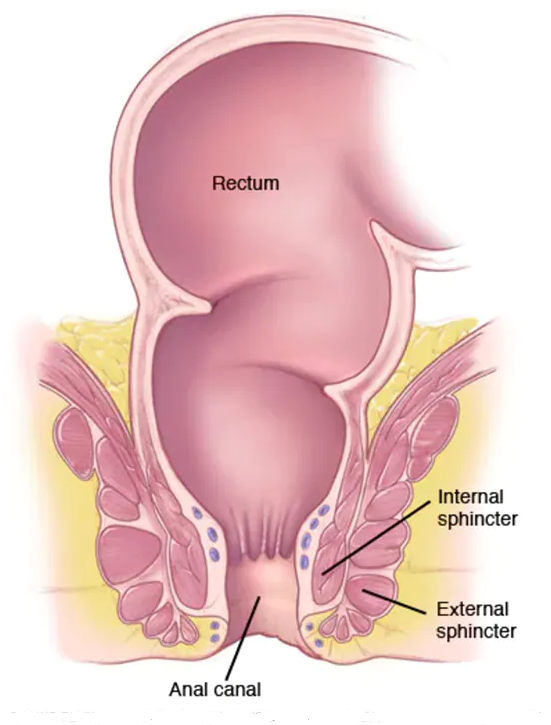Anal cancer is a rare type of cancer that affects the very end of the large bowel.
Anal cancer is a rare type of cancer that affects the very end of the large bowel.
Symptoms of anal cancer

Symptoms of anal cancer can include:
-
Rectal bleeding or blood in the stool
-
Persistent anal itching
-
Pain or discomfort in the anal area
-
A lump or mass at the anal opening
-
A change in bowel habits, such as constipation or diarrhea
-
A feeling of fullness in the rectum
-
Loss of control of bowel movements It is important to note that these symptoms can also be caused by other, less serious conditions. If you are experiencing any of these symptoms, it is important to see a healthcare professional for an evaluation.
Diagnosing anal cancer
Diagnosing anal cancer typically involves a combination of physical examination, laboratory tests, and imaging studies. The following tests may be used to diagnose anal cancer:
-
Digital rectal exam: The healthcare provider will insert a gloved finger into the rectum to feel for any abnormalities.
-
Anoscopy: A short, lighted tube called an anoscope is inserted into the anus to visually examine the area.
-
Biopsy: A sample of tissue will be taken from the anal area and examined under a microscope to look for cancer cells.
-
Endoanal ultrasound: A small ultrasound probe is inserted into the anus to create images of the anal canal and rectum.
-
CT scan, MRI or PET scan: These imaging tests can be used to look for cancerous masses or spread of cancer.
It is important to note that a definitive diagnosis of anal cancer requires a biopsy, which is the removal of tissue for examination under a microscope. Once a diagnosis of anal cancer is confirmed, further tests may be done to determine the stage (extent) of the cancer.
How anal cancer is treated
Treatment for anal cancer typically involves a combination of surgery, radiation therapy, and chemotherapy. The specific treatment plan will depend on the stage and location of the cancer, as well as the overall health of the patient.
-
Surgery: Surgery is often the primary treatment for anal cancer. The type of surgery will depend on the stage and location of the cancer. Options include:
-
Local excision: The cancer and a small margin of healthy tissue around it are removed.
-
Abdominoperineal resection (APR): The cancer and the entire rectum are removed, along with the nearby lymph nodes. A colostomy (an opening in the abdomen through which waste leaves the body) is usually required.
-
Laser therapy: A laser beam is used to destroy the cancer cells.
-
Radiation therapy: Radiation therapy uses high-energy beams to kill cancer cells. It may be used before or after surgery, or as the primary treatment.
-
Chemotherapy: Chemotherapy uses drugs to kill cancer cells. It may be given before or after surgery, or as the primary treatment.
It is important to note that the treatment plan will be tailored to each individual patient, depending on the stage, location, and grade of the cancer as well as the patient's overall health. Follow-up care, including regular check-ups and imaging tests, will be needed to monitor for any recurrence.
It is important to talk to your healthcare professional about the best treatment options for you.
What causes anal cancer?
The exact cause of anal cancer is not known, but certain risk factors have been identified that may increase a person's chance of developing the disease. These include:
-
HPV infection: Human papillomavirus (HPV) is a sexually transmitted infection that can lead to the development of anal cancer.
-
Anal sex: People who have had many sexual partners and engage in anal sex are at a higher risk of anal cancer.
-
Age: The risk of anal cancer increases as people get older.
-
HIV infection: People with HIV have a higher risk of anal cancer.
-
Smoking: Smokers are at a higher risk of anal cancer than non-smokers.
-
Weakened immune system: People with a weakened immune system, such as from organ transplantation or chemotherapy, have a higher risk of anal cancer.
-
Anal warts: People with anal warts have a higher risk of anal cancer.
-
Anal or rectal area abnormal cells: People with anal intraepithelial neoplasia (AIN) or cervical intraepithelial neoplasia (CIN) are at a higher risk of anal cancer.
It's important to note that having a risk factor does not mean that a person will develop anal cancer. However, these factors may increase the chance of developing the disease. It is important to see a healthcare professional for regular check-ups and screenings if you have any of these risk factors.
Comments